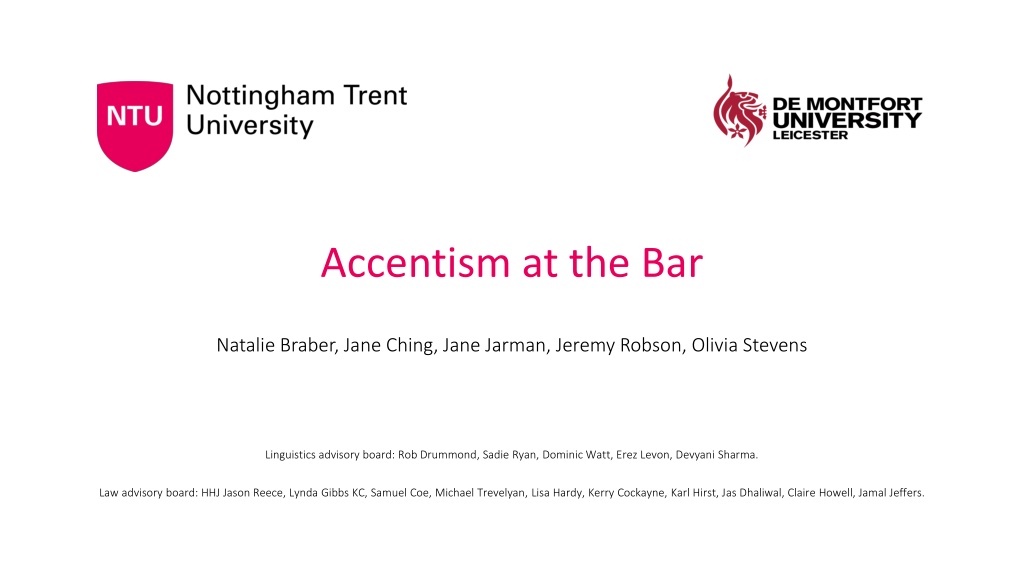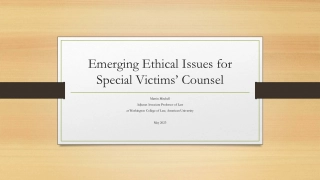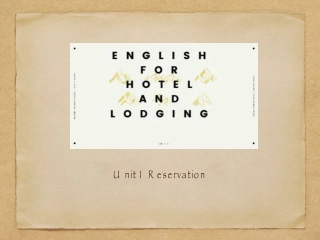Accentism at the Bar
Accent bias at the Bar hinders social mobility for individuals in the UK. Explore how accent prejudice affects access to the legal profession and learn about research questions regarding linguistic biases in legal settings and the role of communication skills for barristers. Discover the importance of addressing accent discrimination to create a more inclusive and diverse legal profession.
Download Presentation
Please find below an Image/Link to download the presentation.
The content on the website is provided AS IS for your information and personal use only. It may not be sold, licensed, or shared on other websites without obtaining consent from the author. Download presentation by click this link. If you encounter any issues during the download, it is possible that the publisher has removed the file from their server.
Presentation Transcript
Accentism at the Bar Natalie Braber, Jane Ching, Jane Jarman, Jeremy Robson, Olivia Stevens Linguistics advisory board: Rob Drummond, Sadie Ryan, Dominic Watt, Erez Levon, Devyani Sharma. Law advisory board: HHJ Jason Reece, Lynda Gibbs KC, Samuel Coe, Michael Trevelyan, Lisa Hardy, Kerry Cockayne, Karl Hirst, Jas Dhaliwal, Claire Howell, Jamal Jeffers.
Olivia Stevens Prof. Jane Jarman Prof. Natalie Braber Prof. Jane Ching Assoc. Prof. Jeremy Robson
What is accent bias at the Bar?
When I started, of course, I had much more of a Liverpool accent than I do now in those days . when I went to my grammar school, we had elocution lessons. But nevertheless, what passed for talking properly in Liverpool, when I came down to London I was instantly recognisable as a Northern lass. I still say bath and laff , as you may notice. Cherie Booth KC
Why does it matter? Accent prejudice prevents upwards social mobility for people within the UK. By investigating barriers in accessing the legal professions, we can improve their representativeness. Accent is not protected under the Equality Act 2010 and can form a basis on which to discriminate, particularly in the elite professions. But the Bar Standards Board has an obligation to encourage an independent, strong, diverse and effective legal profession (Legal Services Act 2007, s 1(10(f))
Our research questions Do people respond more favourably to RP than other linguistic varieties in legal settings? Do barristers believe that this is true thereby suggesting that being well-spoken is a competence for barristers? Is accent a factor in recruitment because it is believed that RP is part of the hidden social capital of this group of professionals? What is said/done about this issue during pre-pupillage education for the Bar?
The Professional Statement for Barristers (E&W) Exercise good communication skills Speak fluent English [B]e articulate and able to speak with fluency [B]e able to adapt their language and communication to suit their audience, which may be clients, colleagues and others, from any background Adapt language and non-verbal communication taking into account the message and the audience Exercise good English language skills Speak articulately and fluently
The survey The survey
OWN ACCENT N = 99 No answer Speakers with eight different English regional accents (including RP) read aloud a set statement similar to a barrister s closing defence statement NW DK Scottish NE Welsh RP WM L EM Participants evaluated each recording on a Likert scale against set characteristics SW SE (not L)
Professionalism and intelligence Professionalism and intelligence
Trustworthiness and friendliness Trustworthiness and friendliness
Confidence and clarity Confidence and clarity
Honesty Honesty
Representation and likelihood of being a Representation and likelihood of being a lawyer lawyer
The interviews The interviews
Historical accent discrimination at the Bar If you ever want to practise at the Chancery Bar, you will have to lose your Yorkshire accent. [a comment by a judge in a moot] [a] very senior silk, who s actually now a High Court judge, said something about how he could never countenance these regional accents at the Bar. [senior barrister]
Times have changed I'd say about twenty per cent of judges maybe might be going with their normal regional accent. Most are still RP. [early career barrister] I'd like to think that no one in any pupillage committee I know would make those kind of comments these days. Certainly if any of myself or my friends or peers heard them, I think we'd stomp them out very quickly. [senior barrister]
There is still accent discrimination And it might just be one sort of comment from one person and it's not representative of the Bar, but when you are already conscious of the fact that you sound different, hearing comments like that definitely creates a barrier, I think. [student] [B]e aware that some people will judge you on the basis of that and there are still barriers, I don't mean you should change your accent, I just mean to be aware of it and be able to deal with it, really. [early career barrister] [S]ometimes it was, . used like a tactic to just kind of maybe knock my confidence as a young barrister. [early career barrister] [Y]ou never know juries might like it and it might well appeal to someone who's also from the local area and it might be easier to persuade them, for example, than someone who's got ... a London accent or something like that. [early career barrister]
Changing your accent? [A] number of very, very senior barristers and judges who we know come from the regions and were brought up there, who do not speak as if they were brought up there and so you've got to wonder how their accents have developed to the way that they have or in the way that they have. [senior barrister] [T]here are there are shifts and tones throughout the day quite regularly, yeah, probably quite subtle ones, but quite regularly. [early career barrister]
Feedback in training [T]hey were quite good about making sure that people didn't feel there was a standard accent for barristers, just sound like yourself they were always very good at telling us to be honest with that. [early career barrister] I remember there were some people who were slightly concerned about it and obviously asking questions to their tutors about will my accent be a hindrance? and the general response was no. [early career barrister] I've been told that I need to work on my tonality because it's quite flat, but I've sort of explained to them that where I'm from, that's how we talk. So, I get kind of what they're saying and they're trying to help me improve. But at the same time, no one else is getting that criticism. [student] I think they sort of frame it as the way that your tone of voice is and you know, don't say this, don't put it like that. But I think definitely there is that undertone of like you need to change the way that you sound a bit. They don't sort of explicitly say that , but you can sort of tell that that's what they are getting at. [student] [T]he more comments I ve heard have actually been from the robing rooms and more older senior members of the Bar not so much actually during my training. [early career barrister]
Career decisions are made about being able to fit in I do stand out when I m at [one of the inns]. But you know what, I think that's the best part about it 'cause in the past as you probably know, the Bar was less diverse, now it's very diverse. I feel like the more I do to keep changing my accent, it's not benefiting anybody. Probably I m fitting in more, but then really you re not changing anything [student] I don't think I had any specific comments at my accent during interview. But sometimes you do. You do get things like, oh, you know, We're not sure you're [the] right fit or whatever that means. [early career barrister] [There are] a lot of chambers [in London] I ve not gone for. I ve got the grades for it. I know straight away I won t fit in, so I m not. I m not going to. [ student]
Perceived discrimination is problematic I ve met barristers with accents and that s great, but they tend to have this sort of like proper English accent, so I think it is worrying if you re trying to break into the profession to not hear anyone that sounds the way you do. [student] I ve never met a barrister who sounds like me. [early career barrister]
Conclusions Can accent bias ever fade unless people retain their natural accents and rise through the system? Accent is still a barrier but this is hard to prove as it is often hidden ( face doesn t fit ). There is often a subtext that certain accents are not acceptable in court (Manchester, Birmingham, Liverpool). Barristers are still supposed to look and sound a certain way. It may not be said as explicitly as it used to, but it seems accent is still an important aspect of being a barrister.












